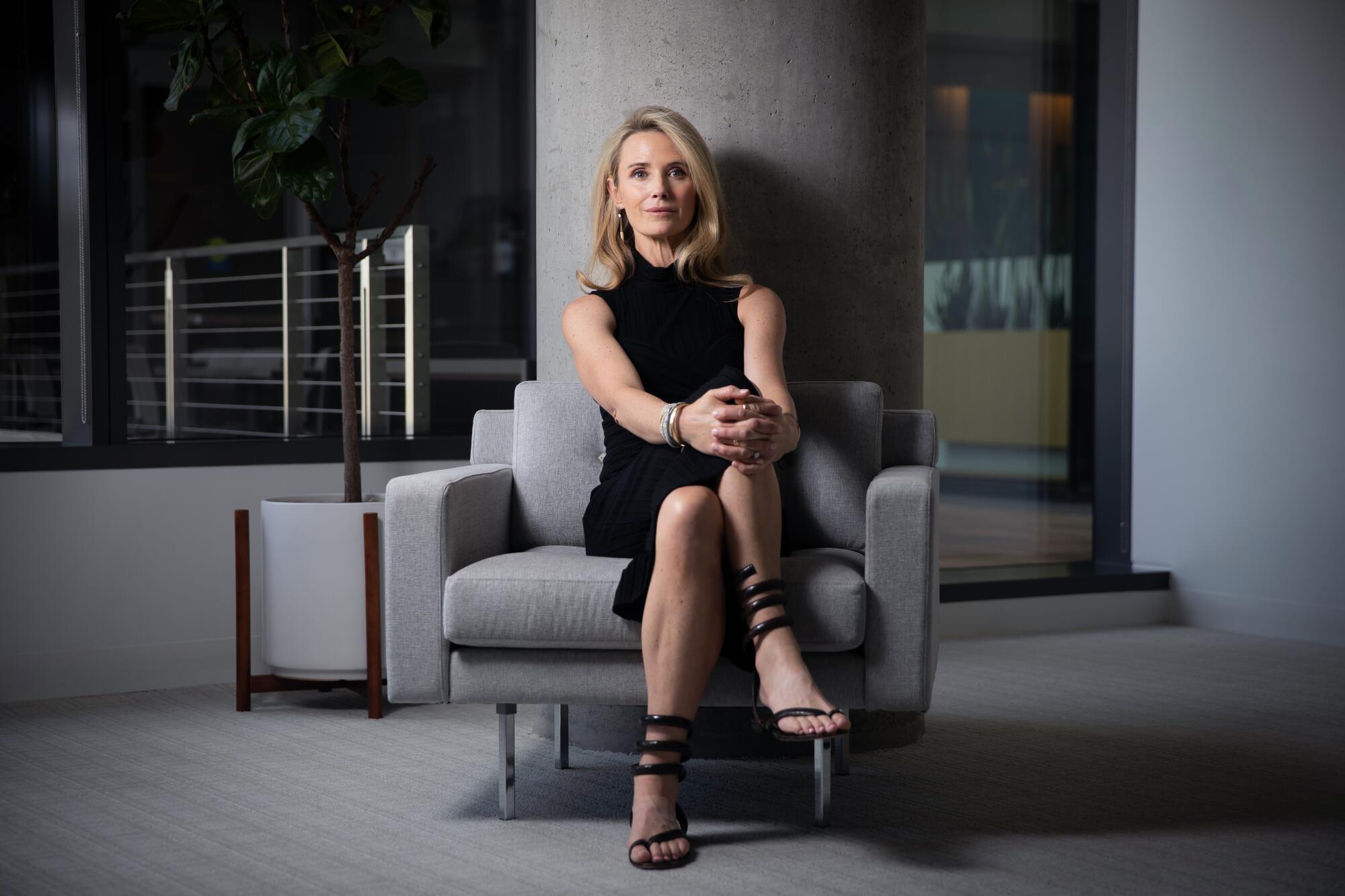
- Share via
SACRAMENTO — Written on a dry-erase board in Jennifer Siebel Newsom’s office overlooking the dome of the California Capitol are two phrases: “gender equity” and “support for survivors.”
As a feminist and documentary filmmaker, Siebel Newsom has been on a mission to tell women’s stories and upend the gender imbalance that permeates life in America. As the first partner of California and wife of Democratic Gov. Gavin Newsom, she has influence at the highest tier of state government.
But none of that prepared her for what happened when she took the stand in November against convicted rapist Harvey Weinstein.
“I thought if I went and spoke my truth that — I didn’t realize how much sexism and misogyny still exists in our culture,” Siebel Newsom said in an interview with The Times. “I was shocked by that. I was shocked. I really was. I mean, shame on me.”
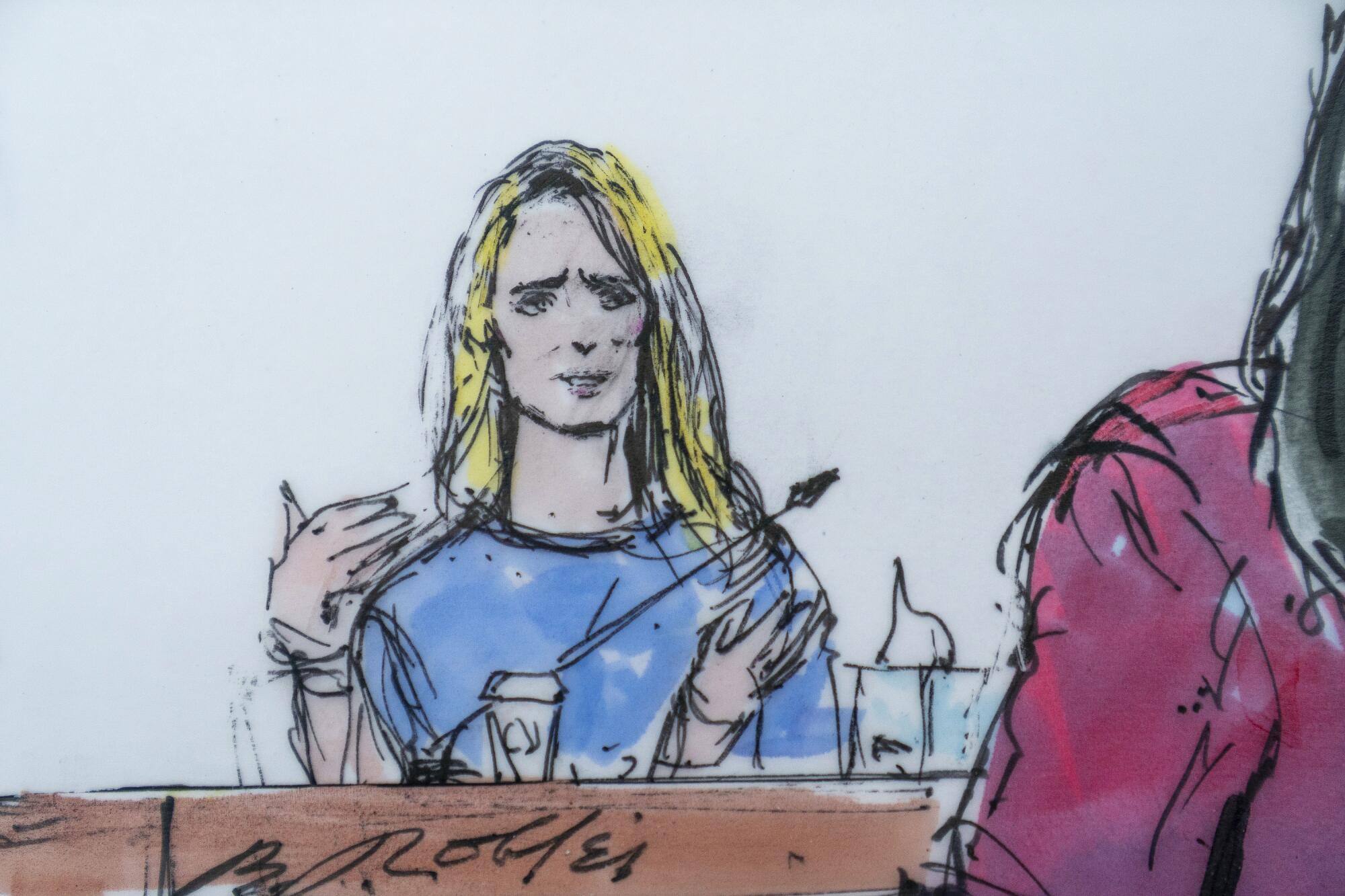
Mark Werksman, a defense attorney for the disgraced film industry kingpin, cast Siebel Newsom, who has a master’s degree in business administration from Stanford University, as “just another bimbo who slept with Harvey Weinstein to get ahead in Hollywood.”
After Siebel Newsom took the witness stand, sobbing as she described being sexually assaulted in a suite at the Peninsula Hotel in Beverly Hills in 2005, another defense attorney belittled her testimony as an “act.”
The defense tried to capitalize on common misconceptions about rape to suggest she was to blame — or even worse, lying. Werksman picked apart descriptions she had given over the years of feeling “paralyzed,” “dead to the world,” “crying” and “whimpering.” The lawyer insinuated that a whimper was merely “a sort of passive, meek expression of unhappiness.”
Siebel Newsom said that she felt assaulted all over again.
“It was a horrific experience. I wouldn’t wish it on anyone,” she said of the trial.
Her pain was compounded when a Los Angeles jury in December deadlocked on the charges in her case. In a video statement after the verdict, Siebel Newsom said the ordeal was excruciatingly traumatic, and teared up as she described the torment of talking about it with her family.
She isn’t crying anymore.
Siebel Newsom, who turns 49 this month, has made a familiar pivot from anguished to motivated. Publicly, she’s talking about funding for women’s health and support for families escaping domestic violence. Behind the scenes, she’s doubling down on trying to make the criminal justice system more fair to other survivors.
“That’s my survival mechanism,” she said. “I think that’s what I learned as a kid to survive. I think so many of us learn to survive by trying to find what good we can make.”
Siebel Newsom has gone through life compartmentalizing her trauma, including the alleged assault and Weinstein’s trial years later, by isolating it from the rest of her life. Putting it into a box.
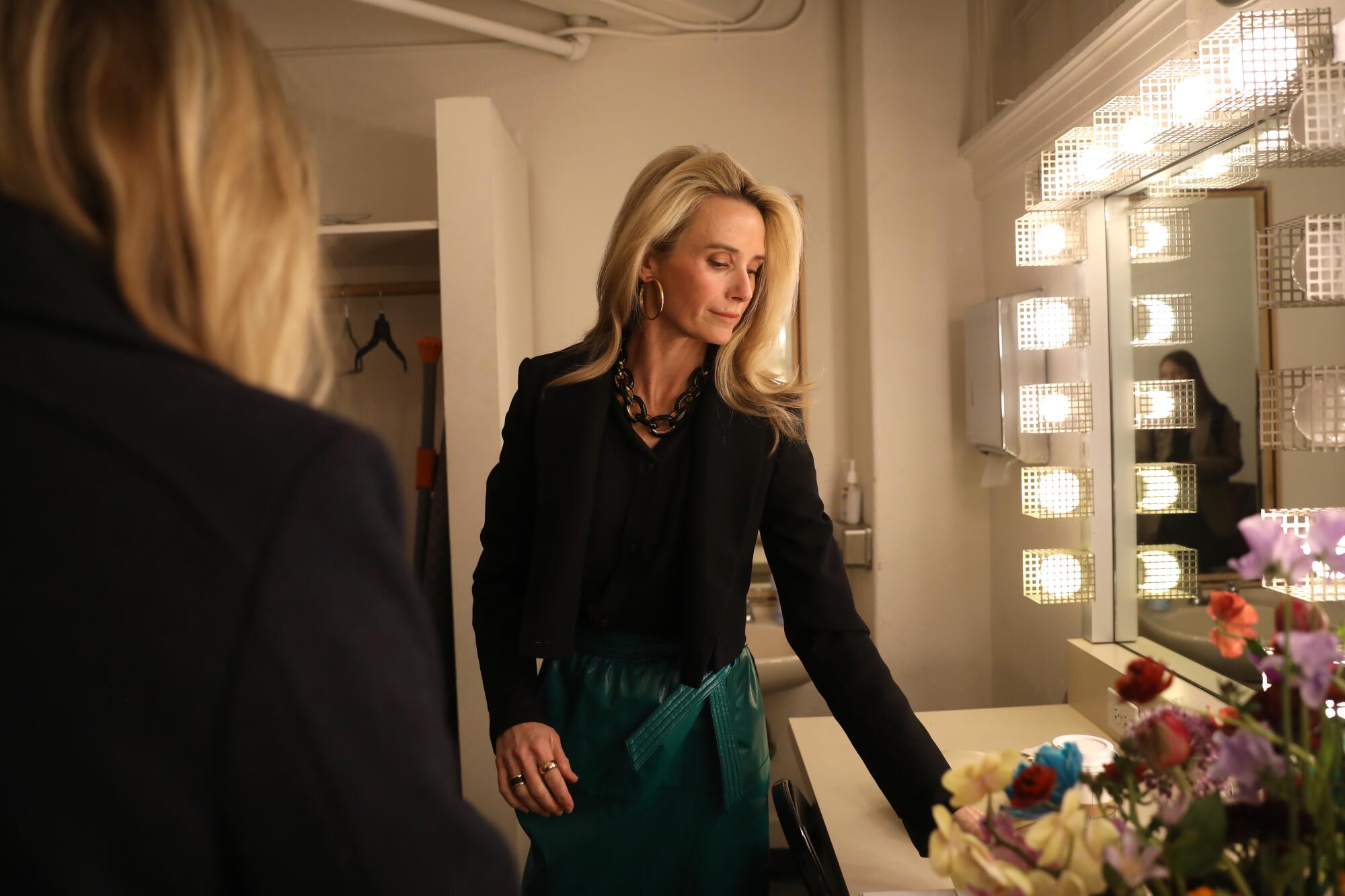
Laurie Pearlman, an internationally recognized clinical psychologist based in Florida, said that’s a common coping method for survivors of trauma that can help them function normally in the world.
Weinstein’s lawyer criticized the evolution of Siebel Newsom’s memories from the first time she shared the account with police to her more detailed descriptions before and during the trial.
Werksman said a defense attorney has to ask tough questions of each witness and challenge inconsistencies in their stories. He said he cross-examined Siebel Newsom as he would any other witness in a criminal trial.
The Constitution “guarantees a defendant the right to confront and cross-examine their accusers,” he said in a statement. “There’s no exception for rape cases. Vigorous cross examination of an alleged sexual assault victim is not sexism, it is the exercise of a fundamental constitutional right.”
Pearlman, who hasn’t treated Siebel Newsom, said it’s also common for survivors to remember more details the more they relive their memories.
“It’s a coping strategy that people use, and if it works for them, it’s a good one,” the psychologist said. “It’s problematic if people put things in a box and never [look] in the box, because one of the things we know about trauma is that avoidance maintains symptoms.”
The tragedies in Siebel Newsom’s box have shaped her identity since an early age.
A few days before her 7th birthday, she and her older sister, Stacey, were playing on golf carts with several other children during a family vacation in Hawaii. Siebel Newsom didn’t see her sister hiding behind her cart when it went backwards, killing the 8-year-old, she said.
Siebel Newsom wrapped her arms around her upper body as she told the story, pausing to collect herself.
The second-eldest of five daughters, Siebel Newsom was raised in a wealthy conservative family in Marin County. Her father, Ken Siebel, is a retired money manager, a GOP political donor and the kind of girl dad who taught them that it’s better to be respected than liked. She said her mother, Judy Siebel, stressed the importance of being a leader; her charity work included co-founding the Bay Area Discovery Museum in Sausalito.
Siebel Newsom said her sister’s death had inspired her to push herself academically, in the arts and in sports.
“I felt the pressure to be perfect, to make my parents forget, by being two daughters instead of one,” she said.
She attended Stanford, where she played for the soccer team and received her MBA. She also played on U.S. Soccer’s youth team for women under 23.
“I’m sure there was survivor’s guilt, and I’m sure, in my subconscious, it’s like I have to make up for that loss, and I have to do something to improve other people’s lives or have an impact, double my own, which is a little crazy,” she said with a laugh. “I don’t use the word ‘crazy.’ But you know, it’s aspirational.”
Siebel Newsom has parlayed her drive into a successful career directing and producing documentary films about gender inequity and the resulting humanitarian crisis, which she awakened to during college and on travels to Africa and Latin America.
Her time acting in Hollywood in the early 2000s reinforced her concerns about the underrepresentation of women in positions of power. She landed a guest-starring role in several episodes of the television show “Life” starring Damian Lewis, and appeared in an episode of “Mad Men” as party girl Juanita Carson, among more than a dozen other small roles over nearly a decade.
She then directed her first documentary, 2011’s “Miss Representation,” which calls attention to the media’s perpetuation of stereotypes of women as one-dimensional and valued for their appearance.
She followed up with “The Mask You Live In” four years later.
Her husband regularly repeats the main theory from that film at news conferences: Society’s toxic definition of masculinity encourages dominance and aggression, and devalues traditionally feminine qualities such as empathy and caring. The film explores how men and boys, confined to masculine stereotypes, are discouraged from embracing their emotions.
Her latest film, “Fair Play,” is based on a book about gender imbalances in the home, and follows couples on a journey of trying to equal the playing field.
Her close friend Lily Riesenfeld said Siebel Newsom practices as much as she preaches.
“I don’t think I’m divulging anything private by saying she was having him do the dishes and sweep the floors,” Riesenfeld said of the first partner and Gov. Newsom during the pandemic.
Siebel Newsom also founded the Representation Project, a nonprofit that promotes her films and work around gender equity. (The foundation’s list of donors has come under scrutiny because some of the companies, such as Pacific Gas & Electric and AT&T, are active in state politics and lobby the governor.)
Siebel Newsom said during the Weinstein trial that her films had allowed her to empower herself and give herself a voice through others.
Today, she says that the way society treats women and girls inspires her to act and to promote sisterhood.
“I’ve always tried to champion that, and through my work through ‘Miss Representation,’ for example, to show girls what’s possible and inspire girls to not just imagine, but create,” she said.
“The gender hierarchy is the oldest form of oppression,” she added. “It’s the roots of oppression and it’s the template for all other oppression.”
She’s continued her advocacy as first partner, a term she changed from “first lady” to be more gender inclusive. Under a campaign to make California better for women, Siebel Newsom has championed issues such as gender pay equity, behavioral health, and diversity and inclusion within the governor’s administration and in corporate boards.
Pearlman said taking an active role to help others is important to the healing process for trauma survivors. Instead of something being done to them, they are choosing to do something.
“You can’t undo what happened to you, but you can try to make the world a better place,” the psychologist said. “And this is a way of saying, ‘No, I’m not defeated. My life was not diminished because of this. In fact, now I have some strength that I can bring to this recovery process and something I can contribute to others.‘”
Siebel Newsom became emotional as she talked about only beginning to forgive herself when her youngest son, Dutch, reached her age at the time of her sister’s death.
“I realized that I’m really hard on myself,” she said. “I realized that you can’t blame a 6- [or] 7-year-old. You can’t ask them to understand things.”
Siebel Newsom’s friends and aides say she uses challenges as motivation, but she also wants to protect others from trauma and share the positive things she experiences.
As a mother and a believer in the importance of nutrition, she has advocated for California’s universal school meals program, which now offers two free meals a day to all schoolchildren regardless of income level. She also developed a program to connect local farmers with school districts to educate students about healthy and sustainable foods.
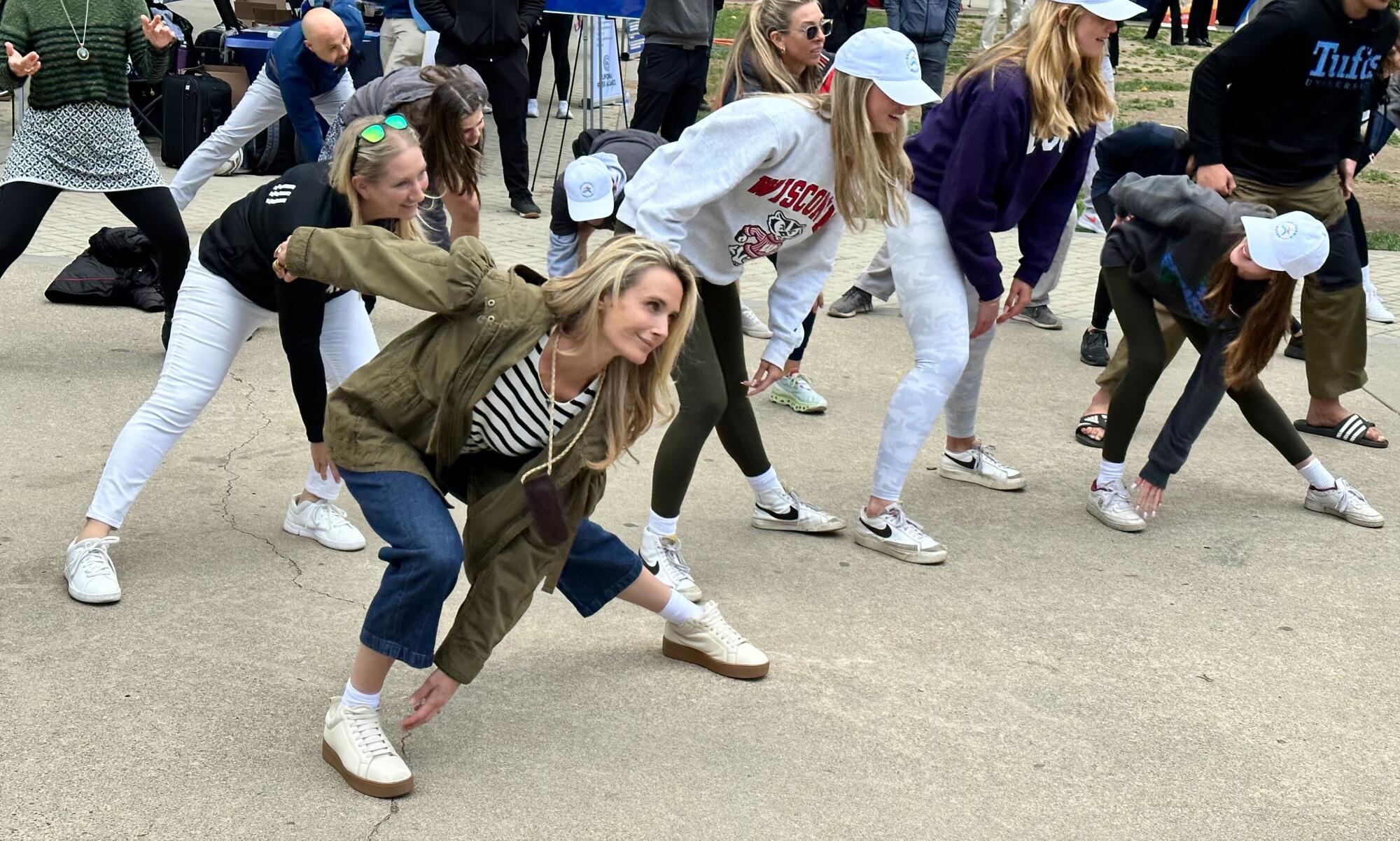
Early in the pandemic, aides say she and California Health and Human Services Secretary Mark Ghaly were among the first in the administration to identify an impending mental health crisis among students.
During a wellness and physical fitness event on the steps of the state Capitol in May, she was quick to commend a young man for bravely telling the crowd about how getting outdoors helped him persevere after a suicide attempt.
“I have a strong propensity to want to protect people, help people, support people and partner,” Siebel Newsom said.
She and her husband both have spoken about a responsibility they feel to take advantage of their time leading California by making lasting change.
Neither feels fully comfortable in the public eye, but they deal with the scrutiny for the good they want to do, said Ana Matosantos, Newsom’s former Cabinet secretary. The governor accepts the attention and criticism that come with the job. Siebel Newsom opens herself up personally, Matosantos said.
Siebel Newsom could have declined to take the stand against Weinstein, for example.
“She knowingly invited a bunch of crap on herself because she thought it was important to step up and demand accountability, and she felt like she could do it,” Matosantos said.
Siebel Newsom said she participated in the trial to support other survivors.
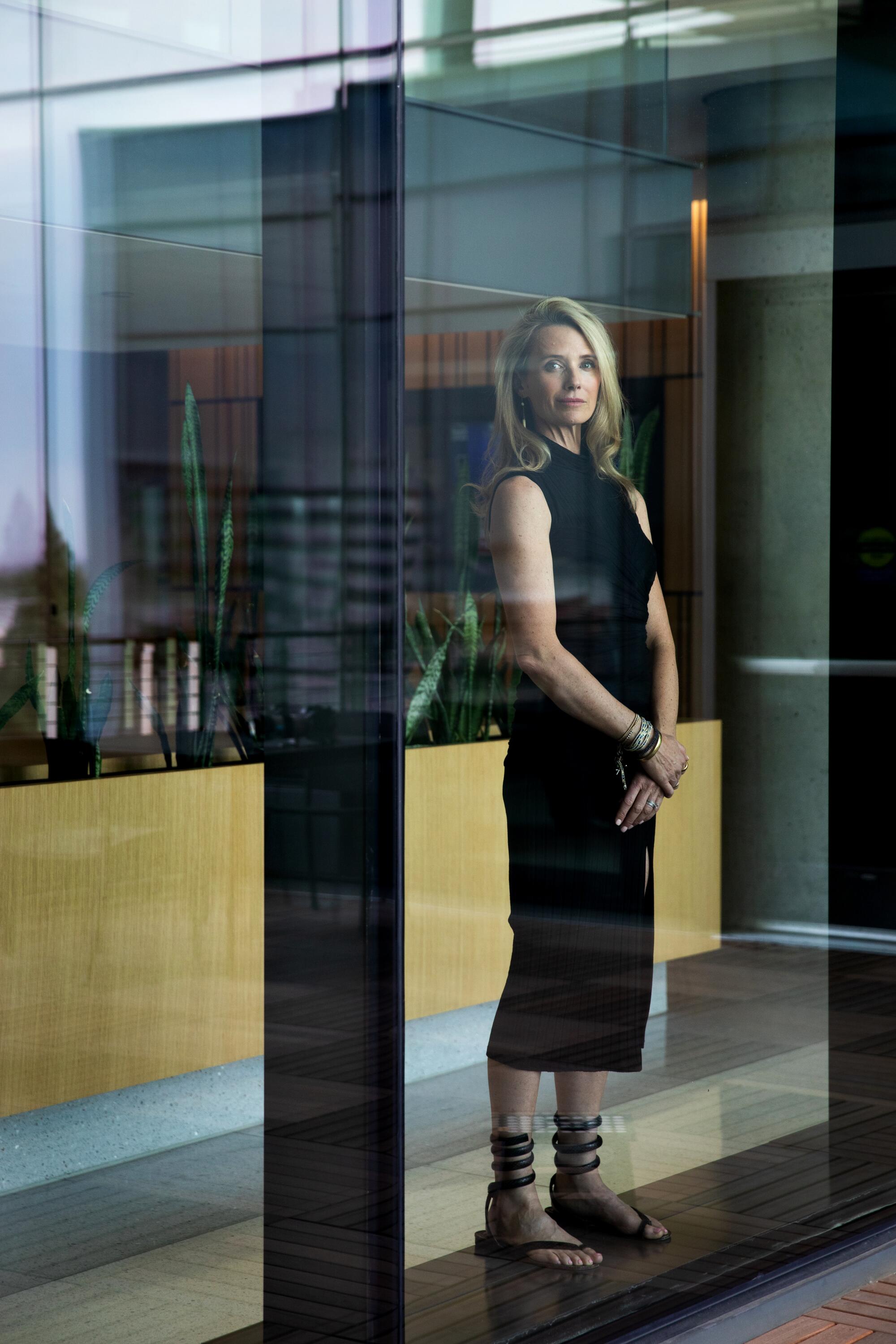
“I felt I could hopefully be helpful and shine a light on, you know, what’s wrong in our society when you have serial perpetrators getting away with rape, sexual assault and harassment for decades,” she said. “And so this was just, I felt like, one way I could contribute, because I [had] stayed relatively silent except for with friends and peers.”
At the USC Women’s Conference in early March, Siebel Newsom joined her sister-in-law, Hilary Newsom, who runs PlumpJack Group, the winery and hospitality company that the governor founded decades ago. The two women huddled backstage at Bovard Auditorium before a panel discussion with California Surgeon Gen. Diana Ramos and Carolyn Meltzer, dean of USC’s Keck School of Medicine.
Siebel Newsom stretched and performed voice exercises to warm up for the talk.
Her 11-year-old son, Hunter, was dribbling a basketball at their house outside Sacramento when she’d left early that morning, she told Hilary Newsom. She‘d sent her oldest daughter, Montana, 13, an “I love you” text from the road and got one in reply. Her youngest two, Brooklynn, 9, and Dutch, 7, were still asleep, and she‘d called them that morning. Brooklynn was confused and asked where she was.
On stage, Siebel Newsom talked about the underfunding of women’s health research and offered a line she would repeat at other events: that women make up more than 50% of the population and deserve better care and support for birthing 100% of the population. She recounted how she was rushed into an emergency C-section giving birth to Montana and left the hospital without any physical therapy recommendations, advice for how to recover from major abdominal surgery or a conversation about postpartum care.
Hilary Newsom cheered on her sister-in-law from the crowd.
“She’s empathetic, she’s caring and you can tell it’s authentic. And for me, that was such a wonderful change from any of my brother’s past relationships,” she said. “I attribute my improved relationship with my brother to Jen.”
Hours later, Siebel Newsom jumped into a black SUV and headed to a domestic violence shelter in South Los Angeles.
The transitional housing complex is one of several shelters operated by the nonprofit Jenesse Center, which offers emergency and longer-term housing and support services for women and families experiencing domestic violence.
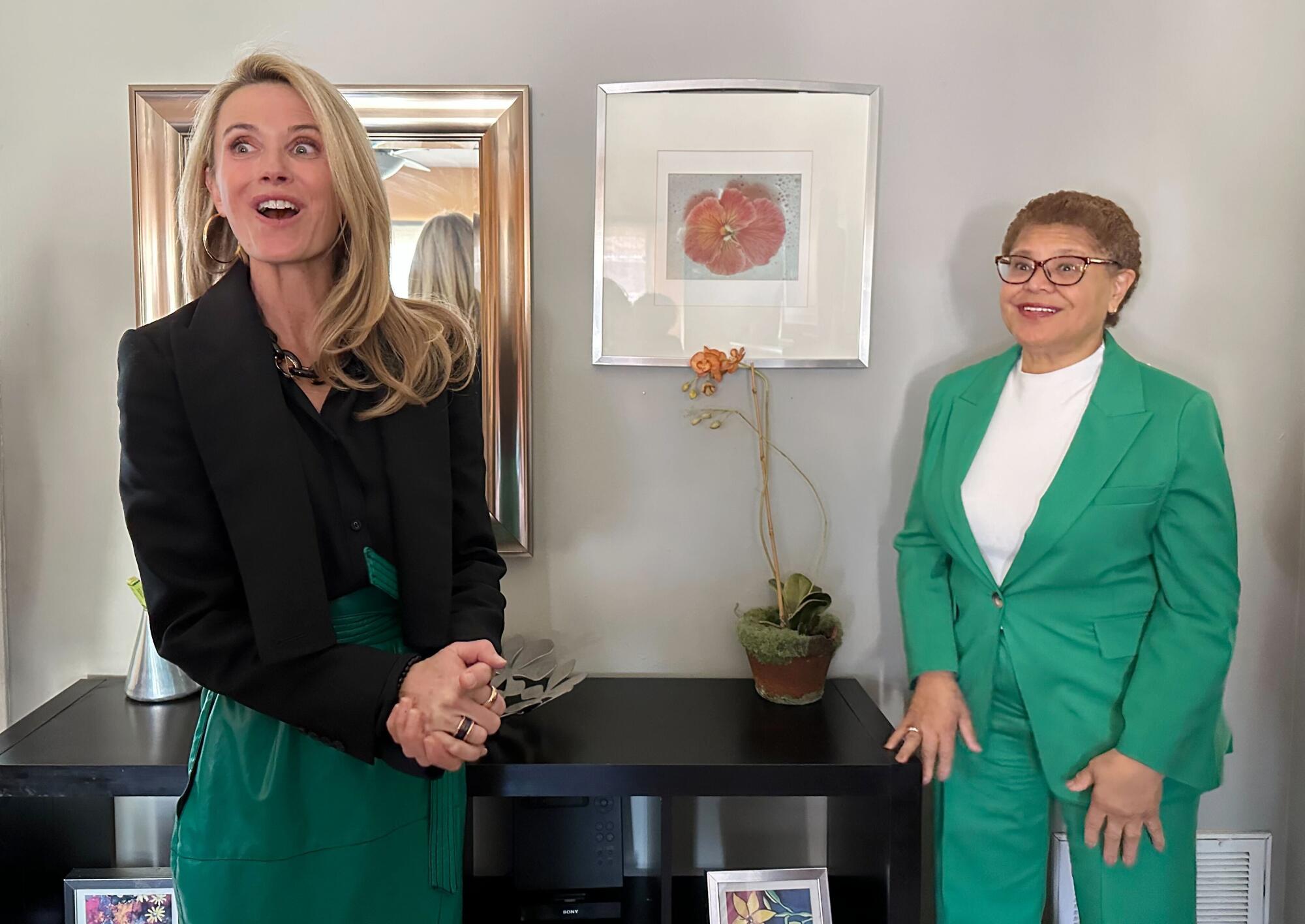
Los Angeles Mayor Karen Bass joined her for a tour of a family apartment and the shelter’s on-site hair salon and wardrobe room; then they sat at two pushed-together metal tables for a discussion with the center’s leaders. Bass said she and Siebel Newsom had met for the first time a few months earlier.
“We both made a commitment to lift up the segment of the population that is invisible,” Bass said. “Having the first partner here is huge. I think, one, it just brings attention to the commitment that the governor has made; but it’s also her commitment separate from him. She stands in her own right as somebody that has fought for the rights of women and children.”
Siebel Newsom had brought along Aileen Getty, the soft-spoken oil heiress and longtime family friend of the Newsoms, and casually introduced her by her first name. Getty, who has struggled with addiction herself, is a philanthropist and supporter of causes including reducing homelessness and protecting the environment.
Siebel Newsom appeared nervous as she read from her own notes about the spirit of partnership and facts about homeless women experiencing sexual assault and violence. Then she settled in as she nodded along and listened to three women talk about their traumatic experiences with domestic violence and how Jenesse had helped them escape with their children and rebuild their lives.
A former exotic dancer said she became homeless and lived in her car after finally gathering the courage to leave her fiance, who managed the club where she worked and controlled all aspects of her life. One woman said she, her husband and seven children looked like a model family to outsiders, who never saw his drunken and violent rages at home. Another became addicted to drugs like her own mother and was sold into sex trafficking.
Jenesse Center Chief Executive Karen Earl said that before meeting Siebel Newsom, she didn’t know what to expect. She asked her staff whether she was nice. After the visit, Earl said Siebel Newsom’s empathy was palpable.
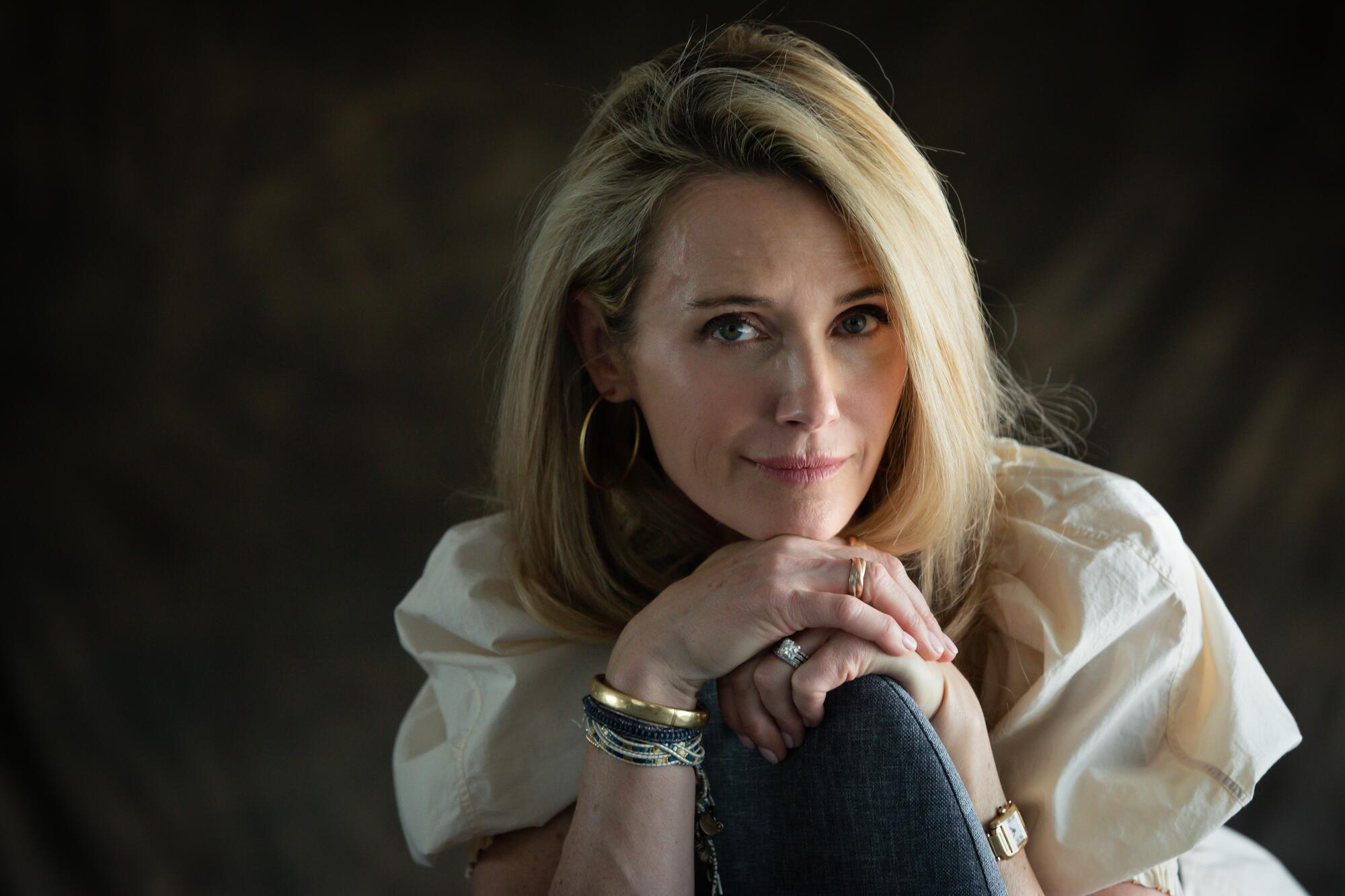
“She’s very, very warm and open,” Earl said. “And then after the conversation, to understand how substantive she is — she was really asking good questions, which means she listened to the women with lived experience.”
Siebel Newsom hopes to use her platform as first partner to push new policy changes for survivorsbefore her husband leaves office.
“I want California to be that shining light on the hill,” she told The Times. “A place where we’ve achieved equity and women have seats at the tables of power, where there’s no more wage gap, less violence against women, where we’ve institutionalized in government and in the private sector family-friendly workplace policies, recognizing that people have lives outside of work, and where your children are known to have the best start in life.”
At the shelter, Siebel Newsom asked the women what more government can do to help.
It’s a question she plans to keep exploring to better understand what survivors need to overcome abuse, and to seek justice for the trauma tucked away in their own boxes.
More to Read
Sign up for Essential California
The most important California stories and recommendations in your inbox every morning.
You may occasionally receive promotional content from the Los Angeles Times.














